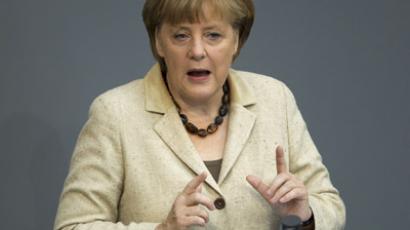Euro exit plan: Ditching austerity for prosperity
Leaving the eurozone could be done over a weekend, claims Lord Simon Wolfson in an interview with RT. A bank holiday needed to convert all assets into a new currency may become the dawn of a new economic era for those who dare to abandon the euro.
A country that dares to leave eurozone would immediately have an enormous competitive boost, sharp decrease to unemployment rates and general kick start to the economy, argues the British businessman.A British peer, multimillionaire and chief executive of Next fashion chain, Lord Wolfson became a sponsor of a prize for the best euro contingency plan. He has paid a reward for a plan for the least disruptive way for a country to exit the eurozone.Lord Wolfson outlines the main problems of the eurozone, explaining why the euro is doomed, despite Germany’s efforts to save it, and why European countries would go on as one entity despite the fall of euro.RT: Why did you decide to sponsor this prize?Lord Simon Wolfson: I sponsored this prize because there was an enormous intellectual vacuum. Nine months ago people were not talking about this. The euro was designed with all lines of retreat cut off. It looks increasingly unstable. The one thing you can be sure of is if it does break up, we need a plan.What this prize has done, it has taken a subject that was taboo, it was a forbidden subject, and it has now brought it into the mainstream debate. More than this, it has produced a fantastic finalist who has actually come up with a very credible answer.RT: Why was the capital economics plan which won in the end so much better than anyone else’s?LW: I think it is because it is so comprehensive and very clear, it was well argued and wasn’t unreasonable in its expectations of what institutions will have to do. It was clear about where the pain would be and where the gain would be. It set a path that would allow any policy-maker in any part of Europe sit down with that and that will their primer, that will be the first that he should read.RT: Can you summarize it?LW: I take you through the proposed timetable. The timetable is: one weekend the banks are closed, a bank holiday is declared on the Monday, and over that weekend in the exiting country all assets, liabilities, wages, prices are converted into the new currency in that country…That currency is then floated on the free markets and the value of that currency would then drop dramatically. That sounds like a problem but actually it is a start of the solution. Because when the currency drops in value that is when Greece can return to competitiveness and begin to tackle things like its 20 per cent unemployment.RT: Say the new drachma was introduced and is immediately de-valued as the plan suggests, how much would that affect people on the ground? How much paying that would be for the ordinary people in Greece?LW: Overnight – very little because all prices would change as well. Yes, your salary would be lower in a newly-devalued drachma – but so would be your mortgage and so would the prices of the goods in the shops. What would happen is that the imports would become more expensive and that will filter through into inflation, and that will affect peoples’ living standards. But at the same time this will have an enormous competitive boost to the economy. Suddenly, domestic producers will be at the enormous advantage to expensive imports. That would create employment, that will boost growth and that will kick start the whole economy again.The history of these sharp devaluations, whether it was in Great Britain in 1931…or Argentina’s devaluation, the initial hit to living standards is followed by dramatic increase in growth. I think that’s what would happen in Greece.RT: At its inception the euro was supposed to provide growth and jobs. What went wrong?LW: What went wrong is that it was fundamentally flawed in the first place. It was a classic cart come before the horse. Over time economies do converge and more people move between areas. Over time a currency union forms almost naturally. If you look at what happened between Eire {Ireland] and Great Britain over the last 30 years, the two currencies almost came to power without anyone planning it. But to force that to happen and over economies that are so difficult was too immature. RT: There was never any exit plan in place. Once a country gets into euro – it got stuck in it. Why do you think that was?LW: I think the architects believe that if there is no line of retreat, the troops would fight that much harder. This is a classic case of burning your boats. It was an enormous mistake, enacting extraordinary political arrogance. They were so convinced that politics could outweigh economics that they refused to think about the possibility of failure.RT: And it does seem that we’re still seeing those political and ideological considerations outlaying economic considerations?LW: Absolutely. All human experience suggests that politicians would cling to their ideals and promises for as long as they possibly can but in the end the weight of economics always wins. Politics never trumps economics.RT: We’ve seen various attempts to cheer up the eurozone, another bailout for Greece and cheap money flooding international banks from the European Central Bank – will these measures work?LW: Absolutely not. What those measures are is they’re refinancing debt that no one thinks could be paid back. They do nothing to address the fundamental problem of part of the euro which is that Portugal, Greece, Ireland and Italy are hugely overvalued. And as a result of that they are uncompetitive and their unemployment rates are at unimaginably high levels, between 15 and 25 per cent. These bailout plans do nothing to address unemployment in Spain and Greece.RT: Do nations like Spain and Greece need to leave the euro in order to promote growth?LW: I cannot see how a country whose interest rate is being held at levels miles above its growth rate, can possibly escape that debt trap without at some point defaulting, devaluing some of that debt and starting again. And until Greece and Spain can be competitive in the international market, I don’t see how they can grow.RT: If Greece did leave, do you think it stands to reason the others to follow?LW: There are two reasons for others to follow. The first would be capital flight. The day Greece leaves and devalues everybody’s bank deposits, is the day that everyone in Spain withdraws their bank deposits and moves them to, say, Germany. The weight of that capital flight might well break the system. If it doesn’t, the next critical point would be if Greece succeeds. Because if Greece comes out and in two years time is doing really well, if its unemployment rate drops down from 20 to 8-10 per cent, then Spaniards would think “hold on a second, what is all that austerity about? They are doing much better out of the system.” And at that point there none there will be an economic pressure, but a political pressure to leave.RT: As a British businessman how would all this affect you?LW: There are two things that Britons are going to worry about. The first one is stability of our banks. And that really is the government’s business. British banks have 300 billion euro worth of assets and a lot of that is going to be devalued. That is going to be a hit on British banks and that gap will need to be plugged whether it be through provision of liquidity or capital. The government must be ready to do both. The second thing is that traders will need to adjust their trading plans. Essentially, goods they can buy would be a lot cheaper, so there is an opportunity for traders to buy more from southern European states. And also, the flipside of devaluation in the south is the appreciation of the currency in the north. British goods to German’s would become cheaper. That is also an opportunity for Britain both to export into Germany and to compete more fairly and effectively in the UK with the Northern European competitors.RT: We still are seeing Angela Merkel holding on almost desperately to the euro, trying to keep it alive. Is that just because Germany benefits from a single currency because it is easier to sell its goods and services in a wider Europe?LW: Germany is slightly a fool’s paradise, because on one hand – yes, it is much easier for Germany to export. On the other hand Germany has lent the EU Central Bank 500 billion euro that has been pumped into southern Europe in order for these goods to be bought. So on the one hand it is selling, but on the other it is lending money. There never is going to be payback to buy those goods at a discounted rate. Yes, industry seems to be doing well at this point, but on the other hand a taxpayer and the banking system are coming under increasing pressure to pay for those discounted exports. And I think the German people are beginning to realize that.RT: Is Merkel wasting her money, essentially?LW: I think the question is, is that money is ever going to be repaid? This is as much a political project as an economic project. I do not think the Germans are just looking at the costs or at the balance sheet. They are looking at their most cherished project of the last 30 years. And I think it will take more than just a cost to change their minds.RT: Is there a future for the European Union without the euro?LW: Absolutely. Britain is a very healthy member of the EU and we’re not in the euro. Let’s face it, the European Union was around for a long time before the euro was introduced. There is absolutely no reason why the European Union should not survive the collapse of the euro.














